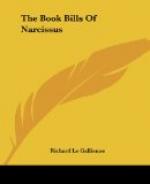GEORGE MUNCASTER
When I spoke of London’s men of genius I referred, of course, to such as are duly accredited, certificated, so to say, by public opinion; but of those others whose shining is under the bushel of obscurity, few or many, how can one affirm? That there are such, any man with any happy experience of living should be able to testify; and I should say, for fear of misunderstanding, that I do not use the word genius in any technical sense, not only of men who can do in the great triumphal way, but also of those who can be in their quiet, effective fashion, within their own ‘scanty plot of ground’; men who, if ever conscious of it, are content with the diffusion of their influence around the narrow limits of their daily life, content to bend their creative instincts on the building and beautifying of home. It is no lax use of the word genius to apply it to such, for unless you profess the modern heresy that genius is but a multiplied talent, a coral-island growth, that earns its right to a new name only when it has lifted its head above the waters of oblivion, you must agree. For ‘you saw at once,’ said Narcissus, in reference to that poet, ’that his writing was so delightful because he was more so.’ His writings, in fact, were but the accidental emanations of his personality. He might have given himself out to us in fugues, or canvases, or simply, like the George Muncaster of whom I am thinking, in the sweet breath and happy shining of his home. Genius is a personal quality, and if a man has it, whatever his hand touches will bear the trace of his power, an undying odour, an unfading radiance. When Rossetti wrote ‘Beauty like hers is genius,’ he was not dealing in metaphor, and Meissonier should have abolished for ever the superstition of large canvases.
These desultory hints of the development of Narcissus would certainly be more incomplete than necessity demands, if I did not try to give the Reader some idea of the man of genius of this unobtrusive type to whom I have just alluded. Samuel Dale used to call himself ‘an artist in life,’ and there could be no truer general phrase to describe George Muncaster than that. His whole life possesses a singular unity, such as is the most satisfying joy of a fine work of art, considering which it never occurs to one to think of the limitation of conditions or material. So with his life, the shortness of man’s ‘term’ is never felt; one could win no completer effect with eternity than he with every day. Hurry and false starts seem unknown in his round, and his little home is a microcosm of the Golden Age.




